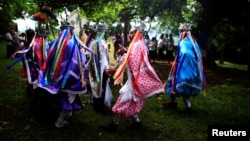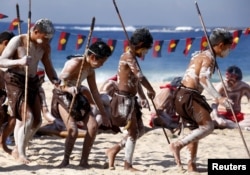The United Nations is calling on all countries to improve opportunities for the world's 370 million indigenous people who consistently face major challenges in accessing education.
In observance of the International Day of the World's Indigenous Peoples on August 9, U.N. Secretary-General Ban Ki-moon highlighted the need to close persistent achievement gaps between indigenous students and their non-indigenous peers. "I call on governments everywhere ... to improve access to education for indigenous peoples and to reflect their experiences and culture in places of learning," he said in a statement.
The U.N. said access to education that is "culturally and linguistically appropriate" is among the major challenges facing indigenous people.
An upcoming U.N. report is expected to say that Inuit high school graduation rates in Nanavut, the northernmost territory in Canada, are far below average, with only 40 percent of school age children enrolled full time.
The U.N. says the report, the State of the World's Indigenous Peoples, Volume III, will note that only 60 percent of indigenous people between the ages of 15 and 19 in Australia pursued higher education in 2013. That is well below the 80 percent participation rate among all Australians in the same age group.
The U.N. also says for Latin America and the Caribbean, the report will say that only 40 percent of aboriginal children complete their secondary education.
In addition to providing access to education that meets their cultural and language needs, experts recommend making women and girls a higher priority and offering more vocational training and adult literacy programs.
Indigenous people represent only 5 percent of the global population but account for 15 percent of the world's most impoverished.
Although Aboriginal people have their own cultural ways of transmitting knowledge, their languages and practices were historically undervalued or ignored when states and religious groups developed formal education programs for them. As a result, the U.N. said the global education sector in particular not only continues to reflect the marginalization of their cultures, but also their ongoing struggle for equal opportunities.
Throughout the day, the U.N. is promoting the need for greater access to education for indigenous people with events in many countries around the world, including Colombia, Ghana, Honduras, Indonesia, Peru and Sri Lanka.






